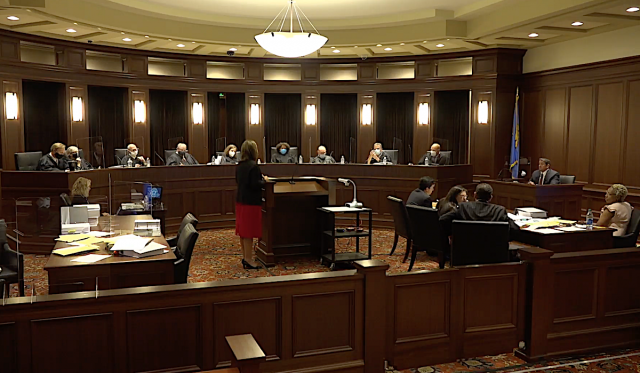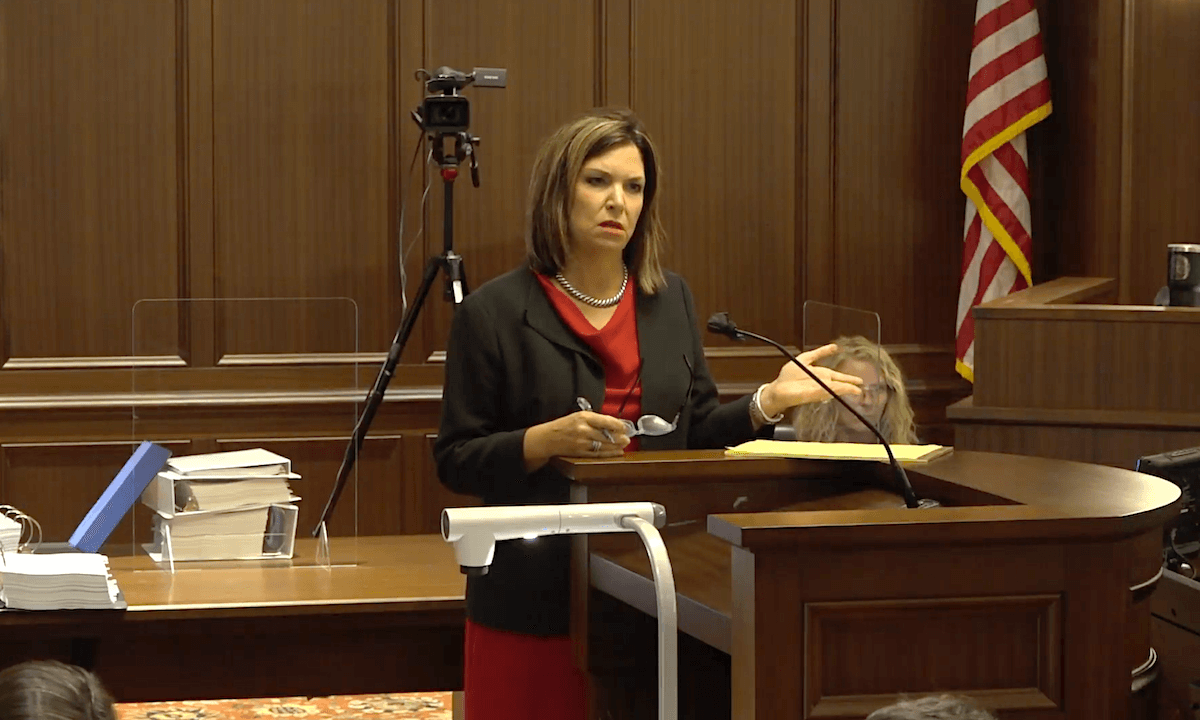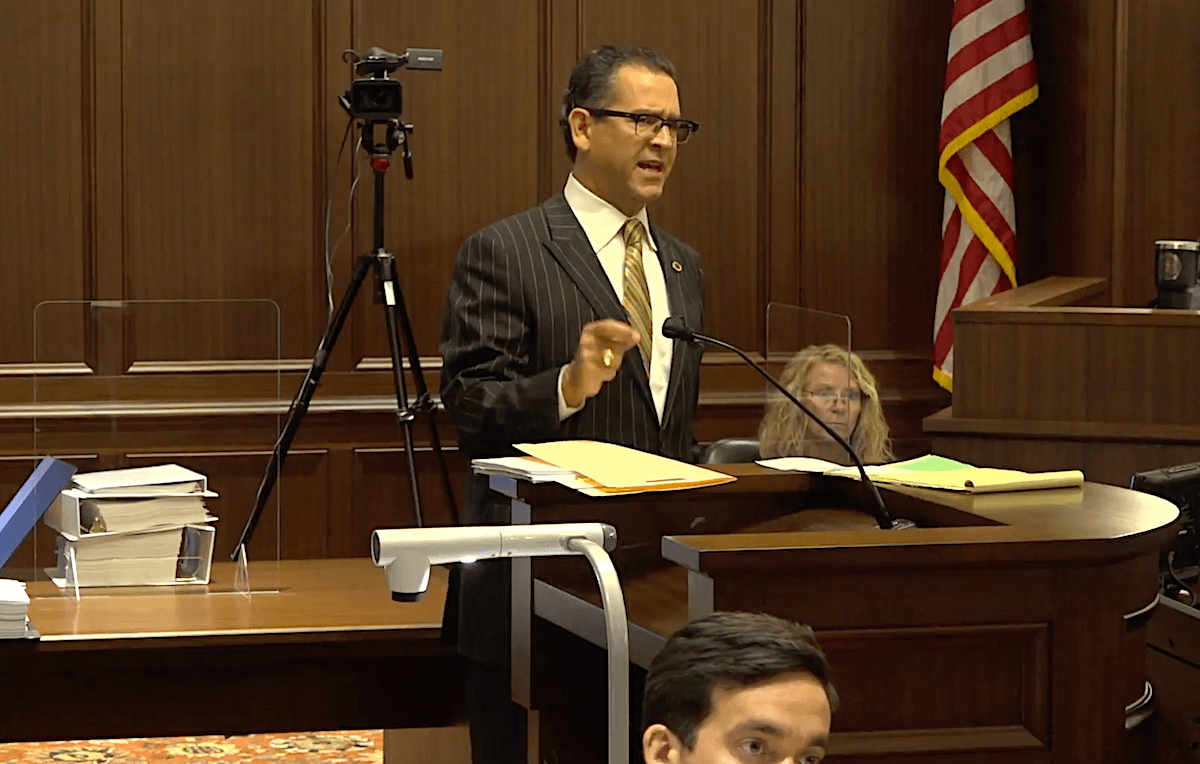
The ouster trial of suspended first-term Oklahoma County District Judge Kendra Coleman began Monday before a panel of fellow state judges and a Tulsa attorney on charges of gross neglect, oppression and ethics violations.
Monday’s first day of trial saw testimony about heated conversations between Coleman and two other judges, as well as state prosecutors complaining about her demeanor, which they called “abrasive, accusatory and hostile.”
More than 100 witnesses — including prominent lawyers, judges and Oklahoma County District Attorney David Prater — are listed as potential witnesses to testify before the rare convening of the state Court on the Judiciary in a trial expected to span at least three weeks.
Coleman faces possible removal just 19 months into her first term in office. She was reprimanded by the Oklahoma Supreme Court in December for delinquent campaign ethics reports and admonished over neglect in addressing personal financial obligations.
Prosecutors contend she later violated the probation and committed additional violations of the Code of Judicial Conduct by mistreating lawyers and litigants — charges denied by her defense counsel.
Coleman’s lawyers hope to convince the trial panel that her prosecution is a vendetta by a district attorney unhappy with unfavorable court rulings. The defense also contends her actions do not justify removal.
“At the end of this trial the citizens of northeast Oklahoma County are the ones that should decide who sits as their judge, and they decided that in November of 2018. And it shouldn’t come down to this because she doesn’t deserve it,” Coleman’s lawyer, Joe White, said during opening statements.
“The evidence will be she never had a chance to establish herself as a district court judge,” White said.
Coleman faces tax charges, too

A key witness in the ouster trial will be Prater, whose allegation of bias lodged against Judge Coleman is part of a flurry of court filings, including a multi-county grand jury indictment for tax evasion and the unusual effort by prosecutors to prohibit the judge from hearing any criminal cases.
Prater has accused Coleman, one of two Black district judges in Oklahoma County, of privately calling the district attorney a racist. Coleman refused Prater’s request that she recuse from all cases brought by the DA. Her refusal to recuse is among the charges leveled against Coleman in the removal trial.
The Oklahoma Constitution empowers the Court on the Judiciary to remove a judge found guilty of neglect of duty, corruption, gross partiality and commission of an offense involving moral turpitude.
The trial before the Court on the Judiciary pits White, a noted Oklahoma City trial lawyer, against former Cleveland County District Judge Tracy Schumacher, who is the acting prosecutor tasked with proving allegations made by the state Council on Judicial Complaints that Coleman failed to pay taxes, pay parking tickets and file accurate campaign finance reports from her election in 2018.
The prosecution also contends Coleman violated terms of a probation imposed by the Supreme Court nine months ago.
The removal trial is being live streamed on the Supreme Court’s website. In-person attendance of the trial is limited to the case participants because of COVID-19 restrictions.
‘It was more like a scolding’
Monday’s first day of trial saw three of Prater’s assistants, Kelly Collins, Gayland Gieger and Adam Panter, testify against Coleman and describe confrontations they believed showed bias against the state’s right to fair trials. Gieger is also the prosecutor in the felony tax evasion charge in Oklahoma County District Court alleging Coleman failed to properly file her state income tax returns.
Pleadings in this and related court proceedings show this week’s removal trial is the culmination of a dispute with prosecutors that erupted in Coleman’s courtroom on Sept. 19, 2019, when Prater sought her removal from all criminal cases.
The DA’s unusual motion for a “blanket” disqualification of a judge from all criminal cases came in a case filed by the prosecutors and dubbed in the court’s docket system as a “criminal miscellaneous initial filing” even though it was not alleging a criminal violation.
A week before that hearing, presiding District Judge Thomas Prince removed Coleman from her criminal docket and assigned her to handle probate and guardianship cases. Despite the re-assignment, the hearing went forward and Coleman denied the request.
But the first allegation by the district attorney of bias against Coleman had previously come in a hearing of a criminal case on May 20, 2019, involving a deadly pit bull attack that killed an elderly woman.
Details of that case filled most of Monday’s first day of witness testimony in the removal trial. It gave insight into how the Oklahoma County court system transfers cases between judges when the dockets get backed up.
In the second-degree manslaughter case involving the dog-mauling incident, the assigned judge was occupied with a murder trial, and the case was re-assigned for trial purposes to Coleman. Before the trial began, she ruled that dozens of gruesome crime scene visuals would not be admitted as evidence.
The two prosecutors, Panter and Collins, questioned the judge’s impartiality, contending that Ed Blau, the defendant’s lawyer in the dog-mauling case, had been a major contributor to Coleman’s election campaign.
“It started to make sense why the rulings were going the way they were,” Panter told the Court on the Judiciary trial panel. Panter filed a motion that Coleman recuse from the case. That motion caused the trial to be put off.
But before the DA’s motion for recusal was heard, the case was again transferred in a confusing set of back-and-forth motions and orders, including some being stricken by the court and a re-assignment to the original judge, Natalie Mai.
Then, on May 30, 2019, Coleman held a hearing on the motion — a hearing for which the district attorney claimed she lacked authority because local court rules required the case be sent back to the original judge. They contend Coleman was holding onto the case as a favor to Blau.
But White’s cross-examination of Panter and Collins suggested that Coleman’s decision to hold onto the case was an attempt to prevent the district attorney’s office from “judge shopping” by filing a recusal motion to disqualify an unfavorable judge in hopes of getting one more to their liking.
Monday’s testimony showed the dispute over which judge should hear the dog-mauling manslaughter case spilled over into heated discussions between Coleman, Mai and District Judge Amy Polumbo, who was the acting chief judge at the time and who believed the local court rule required the case return to Mai after it became apparent a trial would not soon occur in Coleman’s courtroom.
Polumbo testified in Coleman’s trial late Monday. She said Coleman became angry that Polumbo was transferring the case back to Mai and confronted her in her chambers.
“There was a discussion — if you want to call it that — but it was more like a scolding. Very loud and very angry,” Polumbo said. “It was honestly kind of shocking, because it made me wonder why she was so invested in this. I’m simply attempting to abide by the court rule that says if the case is not tried then send it back so it can be tried by the original judge.
“The attitude didn’t seem to match the situation. It was very aggressive.”
Mai also testified in the prosecution’s case against Coleman. She described a similar “heated” conversation over the transfer. She said Coleman believed the recusal motion stayed the case, but Mai said she disagreed because local rules meant it returned to Mai when the jury was released.
“I believe we both became more emotionally involved than in a typical professional interaction between judges,” Mai testified.
She said Coleman was a law school classmate of hers and they talked more with each other than with others.
“It was just a difference of opinion, legally. It had nothing to do with how I feel about Judge Coleman personally,” Mai said.
Mai said Coleman asked her to recuse from the case because Mai was the only new judge elected in 2018 that defense lawyer Blau did not support. Blau is listed as a witness by both Schumacher and White. Months later, Mai did recuse from the case because of a subsequent incident involving her own dog.

‘It’s just another judge with a big head’
The testimony from the assistant district attorneys was a serious criticism of Coleman’s judicial temperament. But one exchange between Assistant District Attorney Adam Panter and defense counsel White drew chuckles from the judges on the trial panel.
Panter admitted he did not file a judicial complaint on Coleman, despite his criticism of her demeanor.
“I’ve got thick skin. I can take it. I don’t get riled very easily, so to me it’s just another judge with a big head. No offense to any.” Panter said, nodding to the judges who will decide the case.
White inquired further.
“Just another judge with a big head? Are there any other judges in Oklahoma County that are of similar nature?” White asked.
Panter replied: “I would take the Fifth (Amendment) on that.”
Still, most of Monday’s trial testimony served as a non-humorous delve into the workings of the state court judges and confrontations among them and with prosecutors. The big issue in the pit bull attack case was whether the jury would see dozens of bloody photographs of the body of the elderly victim. The defendant’s lawyers asked Coleman to keep those photographs out of the case because they said they would unduly prejudice their client. She agreed.
Assistant District Attorney Kelly Collins said that was when it was evident to her that Coleman was being unfair to the state. And during a break in the proceeding, she said she learned that Blau had been not only a financial supporter of Coleman, but had hosted a fundraising event.
“It wasn’t just the adverse rulings, it was her entire demeanor toward us for the hearing,” Collins said. She said she and Panter discussed the matter with Prater and decided to ask Coleman to recuse from the case.
In later court pleadings filed with the Court of Criminal Appeals on Nov. 12, 2019, by Prater and his first Assistant District Attorney Jimmy Harmon, the prosecutors alleged Coleman threatened Judge Thomas Prince with claims of racism in order to pressure him from transferring her off the court’s criminal docket.
Prince was called by the DA as a witness in the Sept. 19 hearing before Coleman to prove the alleged bias against the prosecutors. After Coleman refused to recuse, the DA then asked Prince, who was the court’s chief judge at the time, to take action. But Prince recused himself from the Coleman matter.
Then the Supreme Court first got involved and appointed Cleveland County District Judge Lori Walkley to hear the matter. Walkley denied the Prater’s request on a procedural ground, finding the rules did not allow a blanket re-assignment of judges deemed biased.
But she referred Prater’s allegations against Coleman to the Council on Judicial Complaints — a referral that ultimately led to disciplinary proceedings before the Supreme Court and this week’s trial.
Prater’s allegations against Coleman continued when he asked the Court of Criminal Appeals to overturn Walkley’s refusal to exclude Coleman from all criminal cases. On Jan. 8, 2020, the Court of Criminal Appeals dismissed the DA’s appeal on the grounds that Coleman’s transfer resolved the matter.
Yet pleadings filed in that case show the degree to which the Prater versus Coleman dispute had reached and affected other judges in the courthouse.
A brief filed by the district attorney in the Court of Criminal Appeals revealed that after Prater’s team was unsuccessful getting Coleman to recuse from the dog attack case and disclose to them her campaign contributors, the district attorney found that Coleman’s campaign contributions and expenditure reports had not been filed with the Oklahoma Ethics Commission.
Additionally, when the Court of Criminal Appeals dismissed Prater’s appeal, one of the court’s judges issued a stinging rebuke in a nine-page dissent. Judge Robert Hudson accused Prince of “stonewalling the state” when he refused during the Sept. 19 hearing to answer the district attorney’s questions about conversations he had with Coleman leading up to the recusal hearing.
Hudson, a former district attorney in Payne and Logan counties, served two terms as president of the Oklahoma District Attorneys Association before his appointment by Gov. Mary Fallin to the Court of Criminal Appeals.
Prince had asserted a “deliberative process” privilege against divulging his conversations with Coleman. Prince is also listed by the prosecution as a later witness in the on-going trial.
Meanwhile, Prater credited a news story by The Oklahoman’s Nolan Clay for bringing to light information about Coleman’s tardy tax returns.
MORE COURTS
Judges argue OKCPD has ‘illegally detained’ arrestees by Michael Duncan
Following that report, the multi-county grand jury returned a misdemeanor indictment against Coleman for failing to file state tax returns. Prater later dismissed the misdemeanor charges and filed felony charges against Coleman. Trial on those charges in Oklahoma County District Court is set for November. Coleman’s attorneys say she has worked out payment plans with tax officials.
“In addition to the evidence uncovered by The Oklahoman, the district attorney discovered that during one or more meetings occurring between Sept. 6, 2019 and Sept. 12, 2019, and in the presence of other judges, (Coleman) voiced her unfounded opinion that the district attorney was a racist,” Prater wrote to the Court of Criminal Appeals.
Also on the opening day of trial, Oklahoma County District Judge Timothy Henderson testified that Coleman was seen wearing what he believed to be inappropriate yoga leggings to the courthouse a few months before her suspension in June.
He said it was after entrance to the courthouse was limited to attorneys and persons involved in cases due to the COVID-19 pandemic.
Henderson said he reported it to presiding Judge Ray Elliott. Elliott is listed also as an upcoming witness in the case for the prosecution to testify about interactions with Coleman and “his attempts to counsel with her to correct her conduct.”























